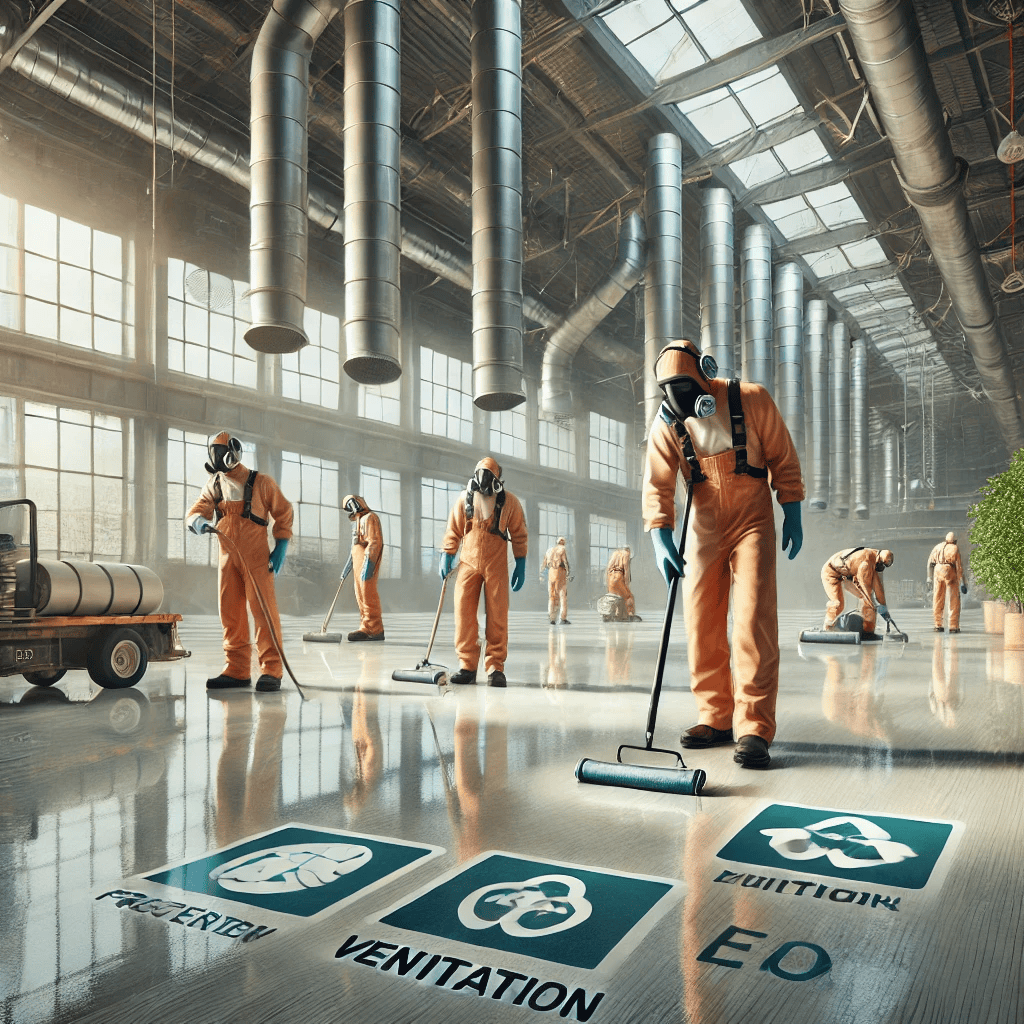- Home
- Services
- EPOXY FLOORING
- POLYURETHANE FLOORING
- DI-ELECRIC FLOORING
- ANTI-STATIC EPOXY FLOORING
- ESD FLOORING
- ACCESS FLOORS
- CAR PARK DECK FLOORING
- CLEAN ROOM FLOORING
- HEAVY DUTY EPOXY FLOORING
- HYGIENE FLOORING
- SELF LEVELLING EPOXY FLOORING
- COLD STORAGE FLOORING
- ACID RESISTANCE FLOORING
- CAR PARK COATING
- EXPANSION JOINTS
- Projects
- Blog
- About Us
- Contact
Is Heavy Duty Epoxy Flooring Safe for My Business or Home?

Heavy-duty epoxy flooring is a popular choice for many businesses and homeowners due to its durability, aesthetic appeal, and ease of maintenance. But one common question that arises is whether it’s safe to install and use in both residential and commercial settings. The good news is that, when installed and maintained properly, heavy-duty epoxy flooring can be a safe and highly effective flooring solution for various environments.
1. Slip Resistance and Safety Features
One of the most important safety considerations for any flooring is slip resistance, especially in environments that see a lot of foot traffic or have high moisture levels. Epoxy flooring is customizable with anti-slip additives, which can be incorporated during installation to create a surface that is safe to walk on, even when wet.
In commercial and industrial spaces, such as factories, warehouses, and kitchens, where spills or water are common, anti-slip epoxy coatings help reduce the risk of slips and falls.
In homes, especially in garages or basements where spills from vehicles or machinery can occur, epoxy flooring with a non-slip finish can make the environment safer.
2. Chemical Resistance
Another major benefit of heavy-duty epoxy flooring is its chemical resistance. Many industrial and commercial environments deal with harsh chemicals, oils, solvents, and other substances that can damage traditional flooring materials. Epoxy flooring is resistant to a wide range of chemicals, which makes it an ideal choice for spaces such as:
Garages: Epoxy floors are resistant to oil, grease, and automotive fluids, which is crucial for maintaining a clean and safe environment in your garage.
Industrial spaces: Factories and warehouses often use heavy machinery and chemicals, and epoxy flooring is designed to handle spills without the floor being damaged or becoming a hazard.
For home use, if you’re installing epoxy in areas like kitchens, bathrooms, or laundry rooms, it can withstand exposure to cleaning agents and water spills without deterioration.
3. VOCs (Volatile Organic Compounds) and Indoor Air Quality
One concern some people have about epoxy flooring is the presence of volatile organic compounds (VOCs) during installation. VOCs are chemicals that can off-gas into the air and may affect indoor air quality. While some epoxy coatings emit higher levels of VOCs, there are low-VOC and VOC-free formulations available today that significantly reduce potential health risks.
For businesses that are concerned about air quality, selecting low-VOC or no-VOC epoxy products can minimize exposure to harmful fumes.
For residential use, you can also ensure that proper ventilation is in place during installation, and choose products that are labeled as low-VOC to keep your indoor air safe.
4. Durability and Long-Term Safety
Epoxy flooring’s extreme durability ensures that it remains intact under the heavy pressure of machinery, foot traffic, or even impact from dropped objects. Because the flooring is designed to be tough, it resists cracks and chips, reducing the likelihood of tripping hazards over time. This is particularly important in:
Warehouses and factories, where employees work with heavy equipment, pallets, and large machinery. The solid, seamless nature of epoxy floors eliminates the risk of tiles or seams becoming dislodged, which can cause accidents.
Homes, especially in garages or basements, where items like tools, sports equipment, or vehicles may be dropped. The smooth, hard surface is less prone to damage than other flooring types, contributing to long-term safety.
5. Fire Resistance
Epoxy flooring has a certain level of fire resistance, which can be beneficial for commercial environments like warehouses or production areas where fire hazards might be more prominent. While it’s not completely fireproof, epoxy does offer some protection from fires by being able to withstand high heat without catching fire or emitting harmful fumes.
In commercial spaces, this makes it a safer choice for areas where sparks or heat may be common, such as in workshops or industrial facilities.
In homes, it can be a safer option for garages where automotive work is done, or for kitchens with stoves and appliances.
6. Environmental Considerations
In terms of safety for the environment, epoxy flooring has a relatively low environmental impact compared to many other flooring materials. Because epoxy flooring is durable, it requires fewer replacements and repairs, reducing the amount of waste that would otherwise go to landfills. Additionally, many manufacturers have made strides in producing more eco-friendly and sustainable epoxy products that use fewer harmful chemicals.
However, to ensure maximum environmental and health safety, always look for low-VOC or eco-friendly epoxy options when choosing a product.
7. Proper Installation and Professional Help
Like any flooring system, the safety of heavy-duty epoxy flooring largely depends on its proper installation. If the installation is done incorrectly, such as improper surface preparation or incorrect mixing of the epoxy and hardener, it could lead to issues like peeling, cracks, or slippery surfaces.
Professional installation ensures that the epoxy adheres properly, cures correctly, and achieves the intended level of safety features, such as non-slip finishes.
Be sure to follow manufacturer recommendations for curing time and ventilation during the installation process.
Have Any Question?
- +91 9962699888
- Sales@Chemcoats.com
- 19/10, Rangarajapuram 3rd Street, Netaji Nagar, West Jafferkhanpet, Chennai, Tamil Nadu 600083
- Sales@Chemcoats.com
- +91 9962699888